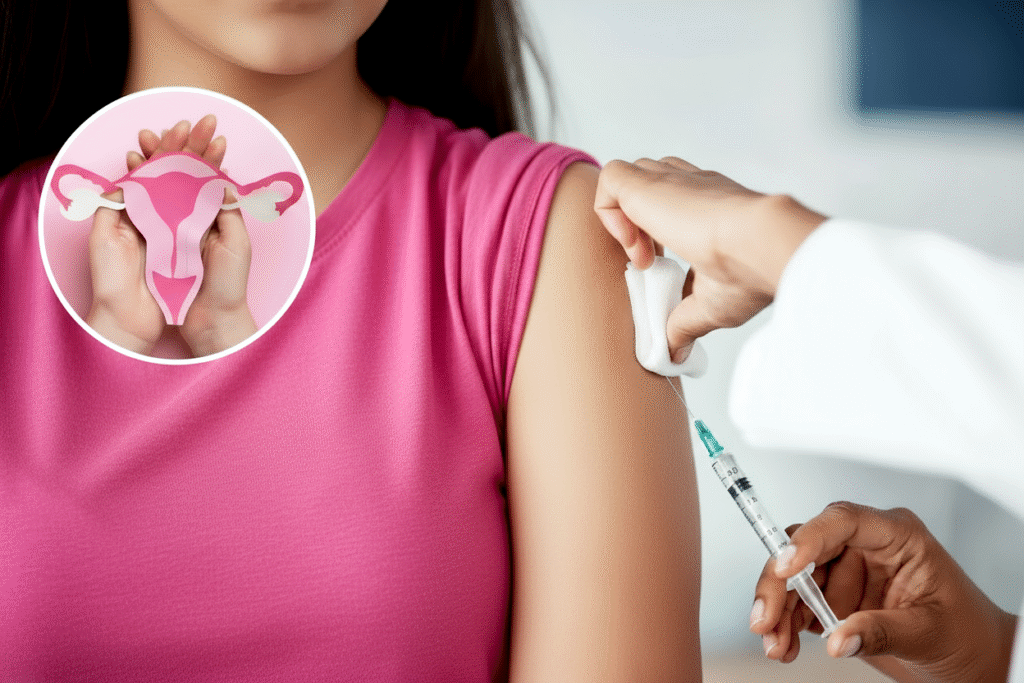Why the HPV Vaccine Matters Today
Chances are you’ve heard of HPV—the human papillomavirus—but might not realize just how common it is. In fact, HPV is the most widespread sexually transmitted infection in the world. The CDC estimates that nearly 80% of sexually active people will contract HPV at some point in their lives. While the infection often clears up on its own, certain strains can lead to cervical cancer, throat cancers, genital warts, and other serious health problems.
Enter the HPV vaccine—a proven, life-saving tool that not only protects against specific types of HPV but also significantly lowers the risk of HPV-related cancers. Despite its importance, myths and confusion still surround it. Who should get it? Is it safe? What age is “too late”?
This guide will clear all of that up. By the end, you’ll know exactly how the HPV vaccine works, why it’s recommended, what the risks and benefits are, and how to integrate this knowledge into real-world healthcare decisions.
What Exactly Is HPV and Why Should You Care?
What is HPV?
HPV (human papillomavirus) is a large group of viruses, with over 200 identified strains. Not all are dangerous. Some cause nothing noticeable, while others cause warts. The high-risk types, however, can lead to cancers of the cervix, anus, penis, throat, and more.
Why is HPV a big deal?
- It is incredibly common—millions get infected yearly.
- It can be silent—most people don’t realize they have it.
- It can be serious—persistent infections may lead to cancers.
Keeping HPV in check is not just about clearing one infection—it’s about long-term cancer prevention.
How Does the HPV Vaccine Work?
The HPV vaccine is a preventive vaccine—meaning it keeps you from getting certain HPV infections in the first place. It doesn’t cure existing HPV.
Here’s how it works:
- The vaccine contains virus-like particles that mimic HPV but cannot cause infection.
- Your immune system recognizes these particles as foreign and builds antibodies.
- If you’re ever exposed to HPV later, those antibodies attack quickly, preventing infection.
This makes the vaccine a classic case of “prevention is easier than cure.” Think of it like installing strong antivirus software before a virus ever reaches your computer.
Who Should Get the HPV Vaccine and When?
What ages is the HPV vaccine recommended for?
- Children and teens (9–14 years old): Best time to vaccinate. Two doses, six months apart.
- Older teens and young adults (15–26 years old): Still recommended, but requires three doses for maximum effectiveness.
- Adults (27–45 years old): May benefit, but effectiveness is less. The CDC suggests shared decision-making—talk to your doctor.
Why vaccinate so young?
The HPV vaccine works best before exposure to HPV. Since HPV is primarily spread through sexual contact, vaccinating before someone is sexually active ensures stronger, long-term protection.
Is the HPV Vaccine Safe?
What clinical studies say
The HPV vaccine is among the most studied vaccines globally. Over 270 million doses have been administered worldwide with robust safety data.
Common mild side effects
- Sore arm at injection site
- Mild fever
- Temporary dizziness or fainting (especially in teens—health workers often recommend sitting for 15 minutes after getting the shot)
Serious but rare risks
Severe allergic reactions are extremely rare—less than one in a million.
In short: The HPV vaccine has an excellent safety record. The benefits far outweigh the risks.
What Types of HPV Vaccines Exist?
There are a few versions of the HPV vaccine, but the one used most widely today is Gardasil 9.
Here’s a quick comparison table:
| Vaccine | HPV Types Covered | Protection Scope | Current Status |
|---|---|---|---|
| Cervarix | 2 (16, 18) | Cervical cancers | Phased out in many countries |
| Gardasil | 4 (6, 11, 16, 18) | Genital warts, cervical cancers | Used less often now |
| Gardasil 9 | 9 (6, 11, 16, 18, 31, 33, 45, 52, 58) | Broader protection against cancers + warts | Widely used today |
Why Is the HPV Vaccine Important for Both Women and Men?
Traditionally, HPV vaccines were marketed as tools for women—mainly to prevent cervical cancer. But men benefit greatly too.
- For women: Protects against cervical, vaginal, and vulvar cancers.
- For men: Protects against penile, anal, and throat cancers. Also prevents genital warts.
- For everyone: Reduces HPV circulation overall (herd immunity).
So yes, guys—this vaccine isn’t just for “her.” It protects you too.
Benefits of the HPV Vaccine
- Cancer prevention: Dramatically reduces risk of cervical and other HPV-related cancers.
- Wart prevention: Stops the spread of HPV strains responsible for genital warts.
- Herd protection: Widespread vaccination lowers rates in the whole population.
- Peace of mind: Knowing you’re protected reduces stress about long-term risks.
Addressing Common Myths About the HPV Vaccine
“The vaccine causes infertility.”
Completely false. No credible study has linked the HPV vaccine with infertility.
“It’s only for women.”
Nope. Men get HPV too, and vaccination protects them.
“It’s too late for me if I’m over 26.”
Not necessarily. If you’re up to 45 and not fully vaccinated, you should discuss it with your provider.
“My child isn’t sexually active yet, so they don’t need it.”
That’s actually the best reason to vaccinate now—before exposure.
What to Expect Before, During, and After Getting the HPV Vaccine
- Before: Your provider will check age and eligibility.
- During: Quick injection in the upper arm.
- Right after: Sit for 15 minutes in case of dizziness.
- Following days: Expect mild soreness or fatigue, but nothing severe.
Tip: Schedule the vaccine at a time when your child or teen doesn’t have a physically demanding event (like a sports game) immediately after.
FAQs on the HPV Vaccine
1. Is the HPV vaccine painful?
The shot feels like a quick sting. Most people describe mild soreness that fades in a day or two.
2. Can you get HPV even if vaccinated?
Yes, but your risk is much lower. The vaccine doesn’t cover all 200+ strains but covers the ones that cause most cancers and warts.
3. Do insurance and healthcare plans cover the HPV vaccine?
In most countries, yes. In the U.S., private insurance and Medicaid typically cover it fully.
4. Can adults over 45 get vaccinated?
Not typically. Research shows limited benefit after 45, when exposure has likely already happened.
5. Does the HPV vaccine mean you don’t need Pap smears?
No. Regular cervical cancer screening is still essential. The vaccine lowers risk but doesn’t eliminate it.
Real-World Example: HPV Vaccine Success Story
Australia provides a stellar case study. Since rolling out HPV vaccination nationally in 2007:
- Rates of genital warts among young people have dropped by over 90%.
- Cervical precancer cases are significantly declining.
- Australia is on track to eliminate cervical cancer as a public health problem by 2035.
That’s the power of proactive prevention.
Final Thoughts: Protecting the Next Generation
The HPV vaccine is more than a medical innovation—it’s a public health revolution. With one simple series of shots, you drastically cut the risk of cancers, protect yourself and your community, and move us closer to a world where cervical cancer is virtually eradicated.
It’s natural to have questions or even doubts, but the science is clear, the safety is well established, and the benefits are immense. Whether you’re a parent weighing the right time for your child, a young adult catching up, or simply someone who values prevention, this is one decision that pays off for a lifetime.
So take action: Talk to your healthcare provider, spread awareness, and be part of a healthier future.

